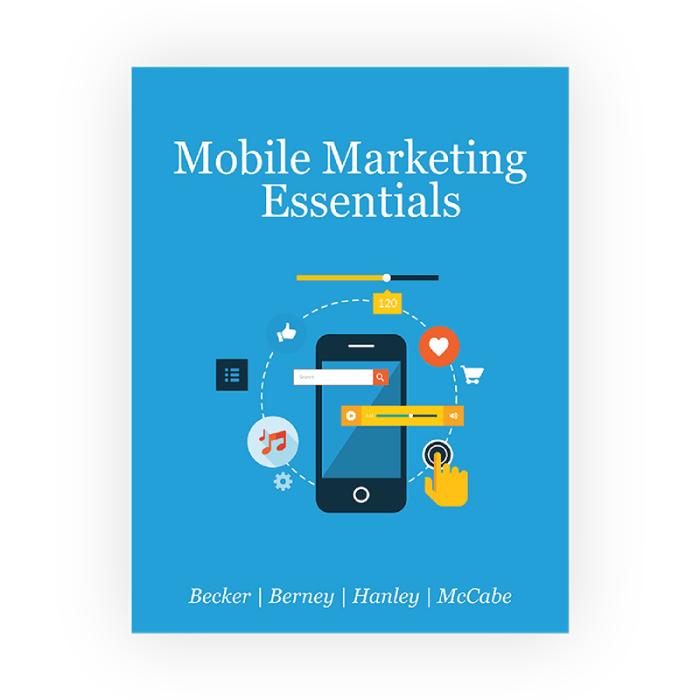Mobile Marketing Essentials sets the stage for this enthralling narrative, offering readers a glimpse into a story that is rich in detail with a touch of american high school hip style and brimming with originality from the outset. From defining mobile marketing to exploring app development and SMS strategies, this guide covers all the key components essential for success in the digital marketing realm.
Overview of Mobile Marketing Essentials

Mobile marketing is a crucial aspect of today’s digital landscape, allowing businesses to reach their target audience directly on their smartphones and other mobile devices. With the increasing use of mobile devices, having a strong mobile marketing strategy is essential for businesses to stay competitive and engage with their customers effectively.
Yo, launching a product online is the move right now! You gotta have a killer strategy to stand out in the digital jungle. Check out this dope article on Launching a Product Online that will give you all the tips and tricks you need to slay the online game!
Key Components of a Successful Mobile Marketing Strategy
A successful mobile marketing strategy consists of various key components that work together to achieve the desired results. These components include:
- Mobile-responsive website design to ensure a seamless user experience across different devices.
- Mobile apps for enhanced customer engagement and loyalty.
- Location-based marketing to deliver personalized messages based on the user’s location.
- Mobile advertising campaigns to reach a larger audience and drive conversions.
- SMS marketing for direct communication with customers through text messages.
- Mobile analytics to track and measure the performance of mobile marketing campaigns.
Benefits of Incorporating Mobile Marketing into a Business’s Overall Marketing Plan
Integrating mobile marketing into a business’s overall marketing plan offers a wide range of benefits, including:
- Increased reach and visibility among mobile users who are constantly connected to their devices.
- Improved targeting and personalization capabilities to deliver relevant content to the right audience at the right time.
- Enhanced customer engagement and interaction through mobile apps, push notifications, and other mobile marketing channels.
- Higher conversion rates as mobile users are more likely to make purchases or take action on their smartphones.
- Better insights and data collection to understand customer behavior and preferences for future marketing strategies.
Mobile Website Optimization
Mobile website optimization is crucial for effective mobile marketing strategies. With the increasing number of users accessing websites through mobile devices, businesses need to ensure their websites are optimized for mobile viewing to provide a seamless user experience.
Yo, launching a product online is the wave of the future, fam! Check out this dope article on Launching a Product Online to learn all the tips and tricks to make your online business pop off like fireworks on the 4th of July!
Importance of Mobile-Optimized Websites
- Improved User Experience: Mobile-optimized websites are easier to navigate on smaller screens, leading to higher user satisfaction.
- Higher Search Engine Rankings: Search engines prioritize mobile-friendly websites in search results, improving visibility.
- Increased Conversions: Users are more likely to engage and convert on websites that are optimized for mobile devices.
Best Practices for Mobile Website Optimization
- Responsive Design: Ensure your website layout adjusts to different screen sizes for a consistent user experience.
- Fast Loading Speed: Optimize images and minimize code to reduce loading times on mobile devices.
- Mobile-Friendly Content: Use concise and easy-to-read content that is suitable for mobile users.
- Clear Call-to-Actions: Make buttons and links easily clickable on touchscreens for better interaction.
Examples of Successful Mobile Optimization
- Amazon: The e-commerce giant has a mobile-responsive website that provides a seamless shopping experience on mobile devices.
- Starbucks: Starbucks’ mobile website allows users to easily locate stores, order ahead, and earn rewards, enhancing customer engagement.
- Google: Google’s mobile website is fast, simple, and optimized for quick searches, reflecting their commitment to mobile user experience.
Mobile App Development

When it comes to mobile marketing strategies, mobile apps play a crucial role in engaging with customers on a more personal level. Developing a mobile app that aligns with your marketing goals can significantly enhance your brand’s visibility and customer interaction. Let’s explore the importance of mobile app development in the realm of mobile marketing.
Tips for Designing and Developing a Mobile App
- Understand your target audience: Before starting the development process, research your target demographic to design an app that resonates with their preferences and needs.
- Focus on user experience: Ensure that your app is easy to navigate, visually appealing, and offers valuable features to keep users engaged.
- Optimize for mobile: Make sure your app is optimized for various mobile devices and operating systems to reach a wider audience.
- Implement push notifications: Utilize push notifications to keep users informed about promotions, updates, and other relevant information to drive engagement.
Benefits of Having a Mobile App for Customer Engagement, Mobile Marketing Essentials
- Enhanced customer loyalty: By providing a seamless and personalized experience through a mobile app, you can increase customer retention and loyalty.
- Increased brand visibility: Having a mobile app can help boost your brand’s visibility and accessibility, making it easier for customers to connect with your business.
- Improved customer engagement: A mobile app allows for direct communication with customers, enabling real-time interactions and feedback to enhance the overall customer experience.
- Higher conversion rates: With a well-designed mobile app, you can streamline the purchasing process, leading to higher conversion rates and increased sales.
SMS Marketing: Mobile Marketing Essentials
When it comes to mobile marketing tactics, SMS marketing is a powerhouse. With almost everyone having a mobile phone that they check regularly, SMS messages have a high open rate and offer a direct line of communication to customers.
Effectiveness of SMS Marketing
- Immediate Reach: SMS messages are usually read within minutes of being received, making it a great way to quickly connect with your audience.
- High Open Rates: Compared to email marketing, SMS messages have a much higher open rate, ensuring that your message gets seen.
- Personalization: SMS messages can be personalized to include the recipient’s name or other relevant information, making the communication more engaging.
Successful SMS Marketing Campaigns
- Burger King: The fast-food chain ran a successful SMS campaign offering customers a coupon for a free sandwich when they signed up for their SMS list. This not only increased their SMS subscriber base but also drove foot traffic to their stores.
- Nordstrom: The retail giant sent out SMS messages to customers alerting them of flash sales and exclusive deals, leading to increased sales and customer engagement.
Tips for Creating Engaging SMS Messages
- Keep it Short and Sweet: SMS messages have a character limit, so make sure your message is concise and to the point.
- Include a Clear Call to Action: Whether it’s a link to your website or a special offer, make sure to include a clear call to action to prompt customer engagement.
- Personalize the Message: Address the recipient by name if possible and tailor the message to their preferences to make it more relevant.
